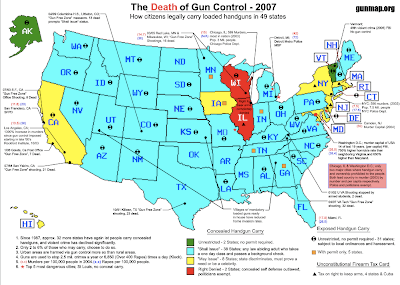Ben Wittes at the New Republic quickly and accurately dissects the Bush Administration's DOJ brief on the DC gun ban case:
It's easy to see why conservatives are in a tizzy. While the brief endorses the D.C. Circuit's view that "the Second Amendment protects an individual right to possess firearms unrelated to militia operations," it also emphasizes that adopting this view "does not render all laws limiting gun ownership automatically invalid" and insists that the lower court "did not apply the correct standard for evaluating [a] Second Amendment claim." What is the correct standard? Laws limiting gun ownership, the government argues, should be subject to "heightened scrutiny" under which "the practical impact of the challenged restriction" gets balanced against "the strength of the government's interest in enforcement of the relevant restriction." According to the Bush administration, "important regulatory interests are typically sufficient to justify reasonable restrictions." Because the lower court did not consider the D.C. law using this standard, the solicitor general argues, the case should be sent back for further consideration.
This is a pretty weak conception of a constitutional right. You can't imagine subjecting, say, the First Amendment to such a test. It would be laughable for the court to permit--or the executive branch to advocate--the abridgment of press or religious freedoms whenever the government's interest in restricting them served an "important regulatory interest" and therefore constituted a "reasonable restriction." . . .
Ben supports this increased flexibility with the Second Amendment because as he puts it: "Whatever conception the founders may have had of the amendment, they didn't have to think about situations like Virginia Tech, and they did not have inner-city gun crime." I suppose that my research has convinced me that no matter how well meaning gun free zones such as Virginia Tech might be, they have had
unintended consequences -- that they encourage attacks and make them more successful. That said, and I appreciate his well meaning concerns, it is hard for me to see how the trade-offs that government faces with the Second Amendment could be different from say the First or the Fourth that also refers to "the right of the people." I thought that Ben had it right last year when he wrote that rather than eviscerating the constitution by selectively picking the parts that we agree or disagree with he wrote that it should simply be
repealed or rewritten if we disagreed with it. See also
this by Ben from last year. I particularly respect this position and admire people who take it because it must be very difficult for someone who supports gun control to take. The reason is simple: given how hard it is to alter the Constitution, accepting this argument means accepting strict limits on gun control.
Here is one question: if the costs of guns are so large, why do you have to have a lower level of scrutiny? If the costs are so high, won't you be able to meet the higher level of scrutiny?
Labels: GunControl, SupremeCourt







